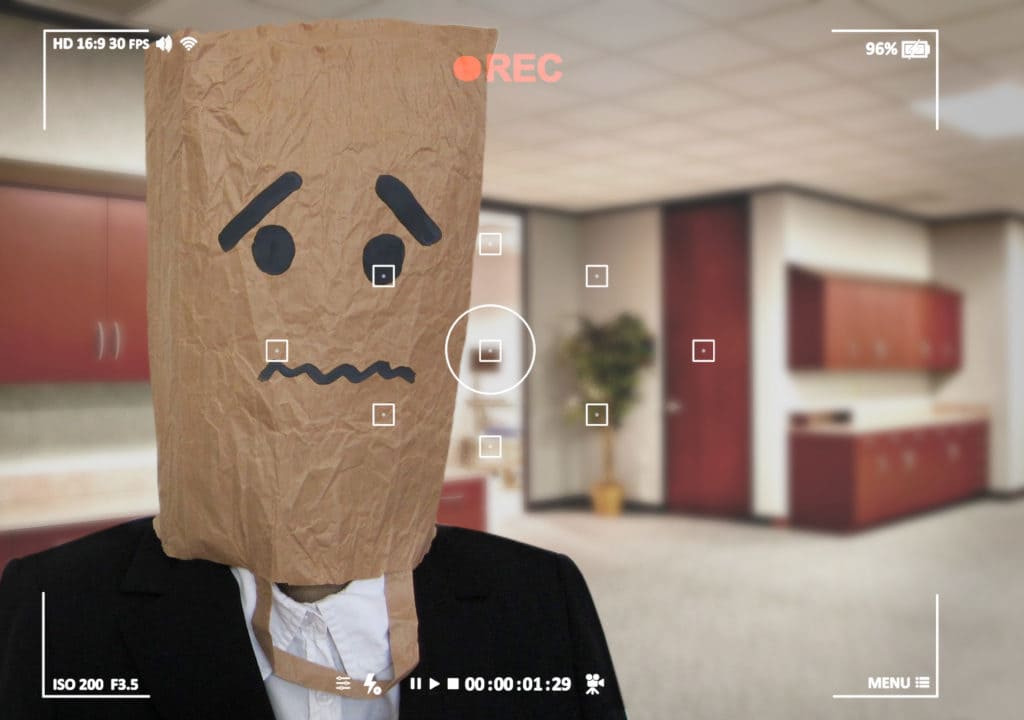Not sure if you should have a video filmed? Videographer Jeremy Tuber shares when you should wait
No, there’s not always room for Jello, and it’s not always a good time to film a video (or take photographs).
Whether you’re considering having a marketing or promotion video filmed (or photos taken) for your small business, practice, sport, or your passion, one common thread is that it will take some time, energy, and involvement on your part.
Your videographer / video production company or photographer should do all of the figurative and literal heavy lifting when it comes to your video or photoshoot (they’ll do most of the work), but because sitting on the sidelines isn’t an option for you (especially for a video project), it’s essential that you’re healthy physically and emotionally before considering a video project or photo shoot. I recognize that sounds silly, (after all, it’s not like you’re applying for NASA’s space program), but from first-hand experience, I’ve seen instances when it would have been wise for a client to hold of getting in from of a camera.
As a last thought before diving in, I put the following ideas down because as a video professional (and past professional photographer) I’ve been in situations before when the shoot should not have moved forward. I politely suggested to the client, “Let’s consider rescheduling,” but most of the time, they wanted to forge ahead and “Just get the shoot over with.”
I am happy to report that even when we should have put things on hold, clients and I worked together to find a solution, but in retrospect, it might have been better to hold off.
Before you reach out to a video or photography professional, who will put you in front of the camera lens, consider a couple of reasons why you might hold off a bit.
Before even contacting a videographer, ask yourself, “How do you feel about myself—right now?”
The majority of adults struggle with self-image issues from time to time. I suppose that we all have a few things we might wish were different about our looks. However, if you’re really unhappy with your current physical appearance (maybe a couple of extra pounds, a few wrinkles on the face, or a skin problem) you might want to consider holding off on having a video or photos done. While that sounds like basic common sense, clients often put themselves in this position, and it leaves them frustrated and fruitless (they end up wasting time, energy, and money).
Truthfully, most viewers watching the video you have filmed (or seeing your photos) won’t even notice (and they won’t care) what you might be self conscious about, but that’s not the point. If you have a strong apprehension about seeing yourself on camera (for whatever reason), avoid a video/photo shoot until you have a positive image of yourself—until you’re feeling more comfortable in your own skin.
I’ve photographed and filmed people who I could tell weren’t happy with their current appearance (sometimes I could tell in just watching how they moved—sometimes through a quick off-hand, negative remark that they made about themselves).
Of course I felt bad for these people. It sucks feeling down about yourself. And I can do a lot to improve someone’s appearance and image with a camera. However, I’ve learned over the years that when clients come in feeling bad about themselves and or their appearance, there’s little lighting, makeup, clothes, camera lenses, and encouragement can do to make them feel better about the video or photos I’ll produce for them.
I appreciated and admired clients going through with the video or photo shoot even if they weren’t feeling the greatest. It takes courage just to get in front of the camera—much more if you’re not feeling great about yourself. However, I wished they would have decided to hold off on moving forward until they felt better. In spite of how much courage and a willingness a client has to forge ahead with the project, I know they won’t like the photos and or video they receive—no matter what I do. The project is doomed from the start.
Having been through this before with clients, I can identify a few stages they go through:
- It starts with a few casual observations/remarks during the shoot. They indicate that they aren’t happy with an aspect(s) of their appearance. They might also exhibit lower energy.
- A few days after the shoot is complete and they receive a draft(s) of their work (the first time they’re seeing themselves on camera), clients do comment about what they like about the work, but they’ll often follow those compliments up with a, “But I just wish…” comment(s) about their appearance. At this stage, they’ll typically tell themselves (and me) “Oh well…it is what it is.” I know from experience, this negative feeling about the work will just get worse over time.
- After they’ve had a few days of reviewing the video or photos, clients start to stew about things—weighing whether they’re making too much of the issue or if they should ask to have things redone. I genuinely feel bad for folks in this position. They don’t want to be a pain, but they’re coming to grips with the notion that the video / photos are going to be around for a long time, and they don’t like the way they look in them.
- After they’ve stewed enough, clients then reach out to me and ask if we can do something about their appearance in the video or photos (although I suspect they recognize not too much can be done). They’re quick to thank me for my time—professing everything they loved about the video / photos, but then they transition into kind of an “It’s not you—it’s me” narrative in explaining that they don’t want the video / photos. They’ll ask if we can redo the shoot, and to their defense, they offer to pay for it.
Make sure you’re feeling good emotionally (beyond your appearance) before having a video filmed
If you’re going through a lot of challenges—perhaps stressful ones that are causing anxiety, depression, or frustration, hold off on filming (or even reaching out to a videographer).
I am not referring to stress coming from an occasional tiff with a colleague, but chronic stress or issues that are weighing you down.
Video professionals can use lighting and makeup to help you look less stressed, tired, etc. while on camera. They can’t, however, artificially raise your energy level—using any software program while in the post-production phase of the project. That positive energy must come from you.
Unfortunately, there is no “boost client’s energy” button in any editing software program that I know of, so if life’s kind of got you down, there’s a real chance that you and even others might notice it while you’re on camera. Do yourself a favor and wait to approach someone about having a video filmed.
Wear what is appropriate—what makes you feel good to your video or photo shoot
While you might not have to reschedule an entire shoot because you’ve decided on the wrong shirt, I would suggest that you make sure you’re comfortable with what you’re wearing—this includes clothes, jewelry, and yes, facial hair.
Check ahead of time with your video professional, your colleagues, and maybe even your significant other before deciding on an outfit. Again, I know that might sound silly, but remember, you might use this video for 3-5 years into the future, so invest a little time before the day of the shoot to plan what you’re going to wear.
To give yourself some flexibility, make sure to bring a few outfits with you to the shoot. Resist the temptation of thinking, “It’s a bother, and I won’t need them anyway.” One of the worst feelings you can have is not having something on set that would have been so easy to bring with you. Make sure there’s a little variety as well—bringing three red (virtually identical) shirts isn’t going to help.
Before moving on, I also wanted to share that men should invest some time a week or more before the shoot to decide whether they want to go with facial hair or not while they’re in front of the camera. I’ve been asked to redo one video shoot and one photo shoot because the client wasn’t happy with their facial hair (one client regretted that he was sporting a beard during the shoot, another client was upset that he wasn’t!)
What if you’ve already paid the videographer, but you find yourself not ready to go?
“Tell me early.” I saw former United States National Security Advisor Colin Powell say that at a church leadership summit, and it’s definitely applicable in this situation. The best advice I can offer is to not reach out to a videographer or photographer until you’re mentally and physically ready. If you’ve already done that, and you’re holding off saying anything to them because you’re scared of upsetting things—don’t. Instead, share your feelings with them as soon as possible—talk it out.
I recognize that it can be difficult to share feelings of insecurity with others, but I recommend it—just be honest with folks, and you’ll find that most of the time they’ll accommodate you if they can. If you don’t feel comfortable talking with or sharing with a videographer or photographer, look to find another. It’s important that you feel comfortable communicating with them.
Avoid going into great detail about your challenges—you don’t need to. Be succinct and be upfront—that’s it.
Ask, rather than demand, if something can be worked out so you can step back for a bit and get things in order. Often times the client and the videographer/photographer decide that a reschedule is a quick and easy solution (a reschedule should not extend more than a month or two away). If a reschedule really doesn’t feel like a good option, ask the videographer/photographer about possibly cancelling the project (maybe to reschedule for the “distant” future). While that option should be considered as a last resort, it might be better than having the video/photos done and then not liking them. Keep in mind that whether you’re asking to reschedule or cancelling the project, there might be a fee associated in doing so—check with your videographer/photographer.
Last thoughts on whether you should wait to have a video filmed
It’s admirable that folks can push through tough times (you’d certainly have my respect), but when it comes to video/photos, just about the worst thing you can do is to grind through a video shoot when you’re not feeling great physically or mentally.
If you find yourself in a position when things just don’t feel right, talk to your videographer/photographer and discuss what options you might have—you both will be glad you did.
PS—If you’ve made it to the end of the article, I hope it’s been helpful. If you think a friend my benefit from reading the piece, forward it on to them. If concerns or questions popped up as you read the article, run them by me by using the chat function on this website (lower right corner). You can also click the following link to get answers and advice to your video questions.

